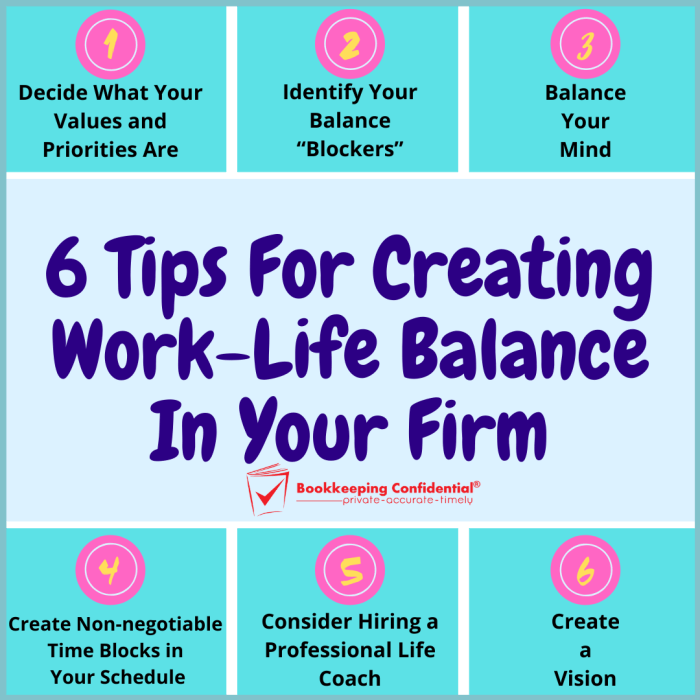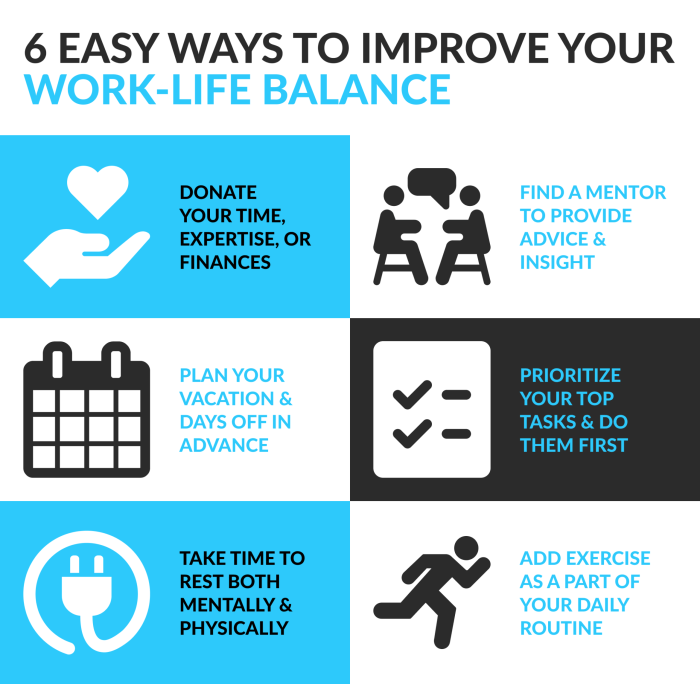Work-Life Balance Tips: Get ready to master the art of balancing your work and personal life like a pro. Dive into practical strategies and insights that will revolutionize your approach to achieving harmony in all aspects of your life.
In today’s fast-paced world, finding the perfect balance between work and personal life can be a challenge. However, with the right tips and mindset, you can create a fulfilling and harmonious lifestyle that prioritizes your well-being and success.
Importance of Work-Life Balance

Work-life balance is crucial for overall well-being because it allows individuals to maintain a healthy equilibrium between their professional responsibilities and personal life. When this balance is achieved, people experience reduced stress levels, improved mental health, and increased productivity.
Benefits of Maintaining a Healthy Work-Life Balance
- Improved mental health and well-being
- Increased productivity and efficiency at work
- Better relationships with family and friends
- Reduced risk of burnout and exhaustion
How an Imbalance Can Lead to Stress and Burnout
When there is an imbalance between work and personal life, individuals may experience chronic stress, fatigue, and burnout. This can lead to a decline in physical and mental health, strained relationships, and decreased job satisfaction. It is essential to prioritize work-life balance to avoid these negative consequences.
Strategies for Achieving Work-Life Balance
Achieving work-life balance is crucial for overall well-being and productivity. By implementing effective strategies, individuals can create a harmonious relationship between their professional and personal lives.
Time Management Tips
- Prioritize tasks based on urgency and importance to allocate time efficiently.
- Use tools like calendars and to-do lists to organize your schedule and avoid procrastination.
- Avoid multitasking and focus on one task at a time to improve productivity.
Setting Boundaries
- Establish clear boundaries between work and personal life by defining specific work hours.
- Communicate your boundaries to colleagues and avoid taking work-related calls or emails outside of designated work hours.
- Create a dedicated workspace at home to separate work from leisure activities.
Importance of Self-Care, Work-Life Balance Tips
Self-care activities are essential for maintaining a healthy work-life balance. It is crucial to prioritize self-care to prevent burnout and enhance overall well-being.
Remember, self-care is not selfish, it is necessary for your mental and physical health.
- Engage in regular exercise to reduce stress and improve mood.
- Practice mindfulness techniques such as meditation or yoga to promote relaxation and mental clarity.
- Allocate time for hobbies and activities that bring you joy and fulfillment outside of work responsibilities.
Flexible Work Arrangements: Work-Life Balance Tips

In today’s fast-paced world, flexible work arrangements have become increasingly popular as they offer employees the ability to balance their work and personal lives more effectively.
Flexible work arrangements come in various forms, including:
Remote Work
- Employees can work from the comfort of their own homes or any location outside the traditional office setting.
- This allows for greater flexibility in terms of work hours and eliminates the need for commuting, saving time and reducing stress.
Flexible Hours
- Employees have the freedom to choose their work hours, as long as they complete their tasks within a set timeframe.
- This enables individuals to work during their most productive hours and accommodate personal commitments.
Tip: Stay organized and set boundaries to maintain a healthy work-life balance while working remotely or with flexible hours.
Flexible work arrangements have a significant impact on work-life balance by providing employees with the autonomy to manage their schedules effectively. This can result in reduced stress, increased job satisfaction, and improved overall well-being.
Work-Life Balance Challenges
Maintaining work-life balance can be tough with various challenges that come our way. Here are some common challenges people face and strategies to overcome them.
1. Time Management
- Set priorities and tackle important tasks first.
- Use tools like calendars and to-do lists to stay organized.
- Avoid multitasking and focus on one task at a time.
2. Boundaries Between Work and Personal Life
- Establish clear boundaries by setting specific work hours.
- Avoid checking work emails or messages outside of work hours.
- Create a designated workspace to separate work from personal life.
3. Work-Related Stress
- Practice mindfulness and relaxation techniques to manage stress.
- Take regular breaks during work hours to recharge and refocus.
- Communicate with your employer about workload concerns and seek support when needed.